On September 1, 2025, Nikko Asset Management Co., Ltd. will change its name to Amova Asset Management Co., Ltd.
This Fund invests in Real Estate Investment Trust (REIT) securities and structures its portfolio in accordance with the calculation method of the Tokyo Stock Exchange REIT Index, and in principle by maintaining such portfolio aims to keep the NAV of the fund closely linked with the movement of the Index.
Key information
| Name: | Listed Index Fund J-REIT (Tokyo Stock Exchange REIT Index) Bi-Monthly Dividend Payment Type | |
| Code: | 1345 |
Net Asset Value and Performance
This fund is a fund of funds investing in investment trust securities.
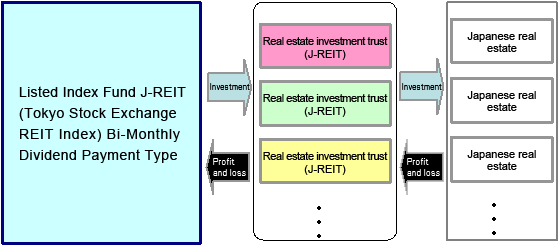
| Fund Name | Listed Index Fund J-REIT, Tokyo Stock Exchange REIT Index, Bi-Monthly Dividend Payment Type Open-end/Domestic/REITs/ETF/Index type |
| Listed Exchange | Tokyo Stock Exchange |
| Issue Code | 1345 |
| Targeted Investments | Securities of real estate investment trust which are employed for the calculation of Tokyo Stock Exchange REIT Index |
| Date Listed | 21 October 2008 (launched on 20 October 2008) |
| Exchange Trading Unit | 100 units |
| Trust period | Unlimited |
| Computation Period | Annually, 9 Jan - 8 Mar, 9 Mar - 8 May, 9 May - 8 Jul, 9 Jul - 8 Sep, 9 Sep - 8 Nov, and 9 Nov - 8 Jan of following year. |
| Closing Date | Annually, on the 8th day of odd-numbered month |
| Dividends | All revenue from dividends arising from the trust assets will be, in principle, paid as dividends on the last day of the fiscal year after deducting expenses. *There is no guarantee on the payment or the amount of dividend. |
Fund Expensess
■Expenses to be borne directly by investors
| Subscription Fee | Independently set by Distributors *Please contact your Distributor for further information. * Subscription Fee is compensation for explanation and information providing about the Fund or investment environment, and is also including expense of clerical processing of the subscription. |
| Exchange Fee | Independently set by Distributors *Please contact your Distributor for further information. *Exchange Fee is compensation for clerical processing of the exchange. |
| Amount to be Retained in Trust Assets | None. |
■Costs paid indirectly by the customer for the trust assets (paid from the fund)
| TER (Total Expense Ratio) |
0.38% (TER includes Trust Fee, management fee and other costs below) Please refer to the prospectus for details. |
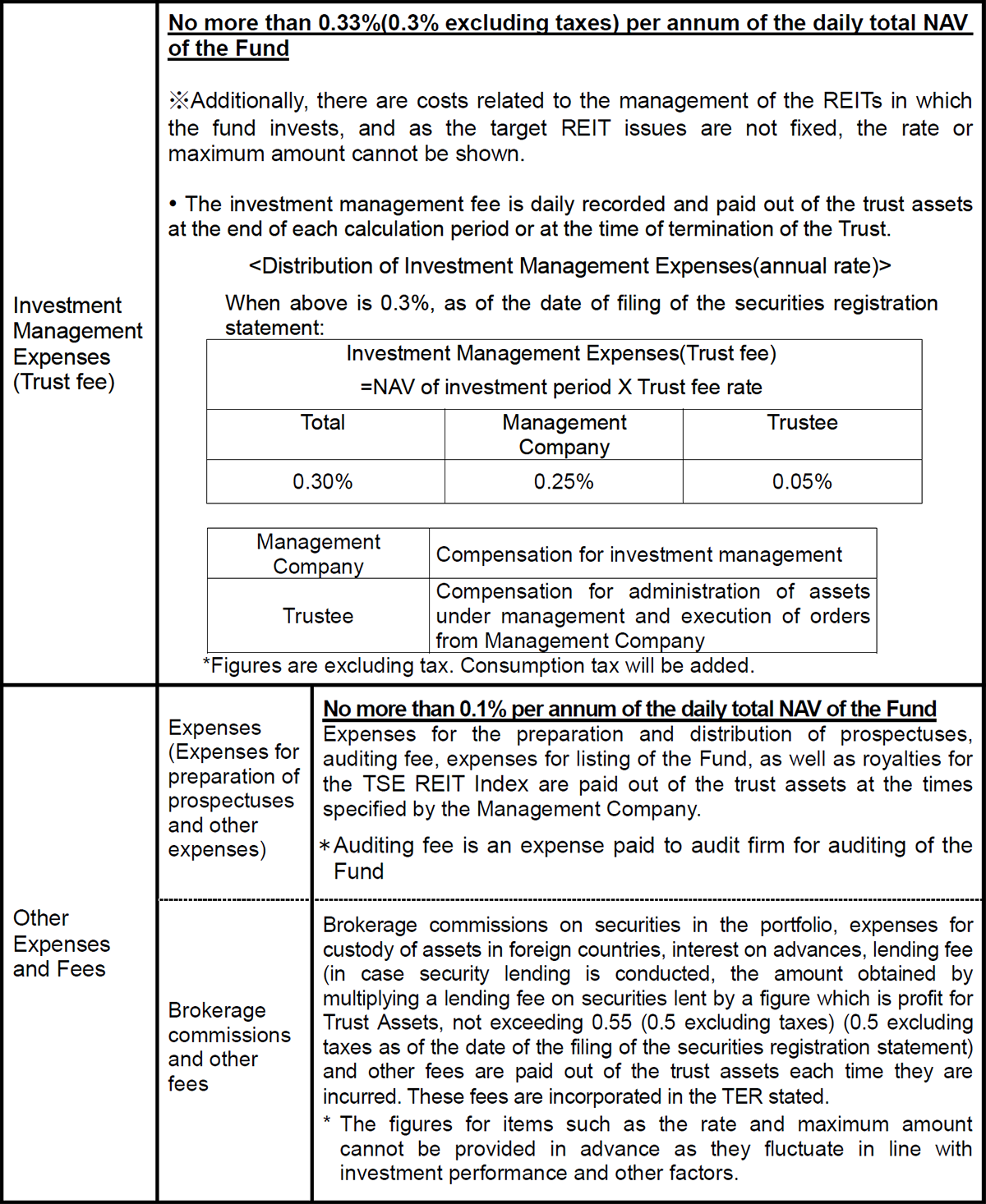
The total amount of expenses of the Fund to be borne by investors varies according to holding length and investment status, and thus cannot be shown.
Major Investment Restrictions
|
Trustee Companies
|
The Tokyo Stock Exchange (TSE) Real Estate Investment Trust (REIT) Index is a weighted aggregate market price type index for all Real Estate Investment Trusts (J-REIT) listed on the Tokyo Stock Exchange. The Index is calculated, with the base date set as March 31, 2003 (closing price). It assumes the aggregate market price on that day to be 1,000, by creating an Index for aggregate market price after the above base date.
If and when necessary, the aggregate market price is modified to avoid being affected by non-market factors such as capital increase, new listings and delistings, etc., to ensure Index continuity.

Further Information
Japan Exchange Group (JPX)
Japan Exchange Group publishes summaries and lists of the ETFs, as well as other valuable information on their website.
S&P Global
- Listed ETF iNav
Please click this link to see the iNAV.
*Link to external sites.
Copyright of the Tokyo Stock Exchange REIT Index
The TSE REIT Index Value and the TSE REIT Index marks or trademarks are intellectual property rights owned by JPX Market Innovation & Research, Inc. or its affiliates (hereinafter, “JPX”). All rights and know-how relating to the TSE REIT Index, including calculation, publication and use of the TSE REIT Index Value as well as those relating to the TSE REIT Index marks or trademarks belong to JPX.
JPX reserves the rights to change the methods of calculation or publication, to cease the calculation or publication of the TSE REIT Index Value or to change the TSE REIT Index marks or trademarks or cease the use thereof.
JPX makes no warranty or representation as to the results derived from the TSE REIT Index Value and the use of the TSE REIT Index marks or trademarks, and as to the TSE REIT Index Value on any particular day.
JPX does not guarantee the accuracy or completeness of the TSE REIT Index Value and data contained therein. Further, JPX shall not be liable for the miscalculation, incorrect publication, delayed or interrupted publication of the TSE REIT Index Value.
This Fund is not in any way sponsored, endorsed or promoted by JPX.
JPX does not bear any obligation to give an explanation of this Fund or advice on investments to any purchaser of this Fund or to the public.
JPX does not consider the needs of Nikko Asset Management or the Fund's purchasers in the component stocks or calculation of the TSE REIT Index Values.
Including but not limited to the foregoing, JPX shall not be responsible for any damage resulting from the creation, sale and promotion of this Fund.
- 21 Feb 2025 — Earnings Report for Fiscal Year ended Jan 2025
- 21 Aug 2024 — Earnings Report for Fiscal Year ended Jul 2024
- 21 Feb 2024 — Earnings Report for Fiscal Year ended Jan 2024
- 21 Aug 2023 — Earnings Report for Fiscal Year ended Jul 2023
- 21 Feb 2023 — Earnings Report for Fiscal Year ended Jan 2023
- 19 Aug 2022 — Earnings Report for Fiscal Year ended Jul 2022
- 21 Feb 2022 — Earnings Report for Fiscal Year ended Jan 2022
- 20 Aug 2021 — Earnings Report for Fiscal Year ended Jul 2021
- 19 Feb 2021 — Earnings Report for Fiscal Year ended Jan 2021
- 20 Aug 2020 — Earnings Report for Fiscal Year ended Jul 2020 (9 Jan 2020 - 8 Jul 2020)
- 20 Feb 2020 — Earnings Report for Fiscal Year ended Jan 2020 (9 Jul 2019 – 8 Jan 2020)
- 21 Aug 2019 — Earnings Report for Fiscal Year ended Jul 2019 (9 Jan 2019 - 8 Jul 2019)
- 21 Feb 2019 — Earnings Report for Fiscal Year ended Jan 2019 (9 Jul 2018 - 8 Jan 2019)
- 21 Aug 2018 — Earnings Report for Fiscal Year ended Jul 2018 (9 Jan 2018 - 8 Jul 2018)
- 21 Feb 2018 — Earnings Report for Fiscal Year ended Jan 2018 (9 Jul 2017 - 8 Jan 2018)
- 21 Aug 2017 — Earnings Report for Fiscal Year ended Jul 2017 (9 Jan 2017 - 8 Jul 2017)
- 21 Feb 2017 — Earnings Report for Fiscal Year ended Jan 2017 (9 Jul 2016 - 8 Jan 2017)
- 19 Aug 2016 — Earnings Report for Fiscal Year ended Jul 2016 (9 Jan 2016 - 8 Jul 2016)
- 19 Feb 2016 — Earnings Report for Fiscal Year ended Jan 2016 (9 Jul 2015 - 8 Jan 2016)
- 21 Aug 2015 — Earnings Report for Fiscal Year ended Jul 2015 (9 Jan 2015 - 8 Jul 2015)
- 20 Feb 2015 — Earnings Report for Fiscal Year ended Jan 2015 (9 Jul 2014 - 8 Jan 2015)
- 21 Aug 2014 — Earnings Report for Fiscal Year ended Jul 2014 (9 Jan 2014 - 8 Jul 2014)
- 20 Feb 2014 — Earnings Report for Fiscal Year ended Jan 2014 (9 Jul 2013 - 8 Jan 2014)
- 21 Aug 2013 — Earnings Report for Fiscal Year ended Jul 2013 (9 Jan 2013 - 8 Jul 2013)
- 21 Feb 2013 — Earnings Report for Fiscal Year ended Jan 2013 (9 Jul 2012 - 8 Jan 2013)
- 15 Aug 2012 — Earnings Report for Fiscal Year ended Jul 2012 (9 Jan 2012 - 8 Jul 2012)
A unit stock is a unit in a stock basket that an investor applying for an acquisition through addition contributes to. A unit stock is also a unit in a stock basket that an investor who applies for an exchange receives in trade for a beneficial interest.
This Fund can be applied for as a direct addition and exchange at Authorised Participants in addition to the Tokyo Stock Exchange. In this case, "unit stock" is referred to as a unit. When applying as a direct addition and exchange, please keep in mind that we cannot accept your application on the following dates:
Authorized Participants
- SMBC Nikko Securities Inc.
- ABN AMRO Clearing Tokyo Co., Ltd.
- Barclays Securities Japan Limited
- BNP Paribas Securities Japan Ltd.
- BofA Securities Japan Co., Ltd.
- Citigroup Global Markets Japan Inc.
- Daiwa Securities Co. Ltd.
- Goldman Sachs Japan Co.,Ltd.
- JPMorgan Securities Japan Co., Ltd.
- Mizuho Securities Co., Ltd.
- Mitsubishi UFJ Morgan Stanley Securities Co., Ltd.v
- Morgan Stanley MUFG Securities Co., Ltd.v
- Nomura Securities Co., Ltd.
- Societe Generale Securities Japan Limited
- Tokai Tokyo Securities Co.,Ltd.
Daily Creation and redemption are based on ETF's NAV calculated in early evening. Confirm non-tradable days by referring to trading calendar on our official homepage. Basket for creation is continually-updated on our official homepage.
Basically sell/buy at last price of T day's market.
The flow chart below is showing the creation/redemption process for Nikko AM ETFs. Please note that transactions cannot be processed for days on which applications are not accepted.
Creation Flow for In-kind Creation/Redemption Type ETFs(Using obligation assumption service by JSCC)
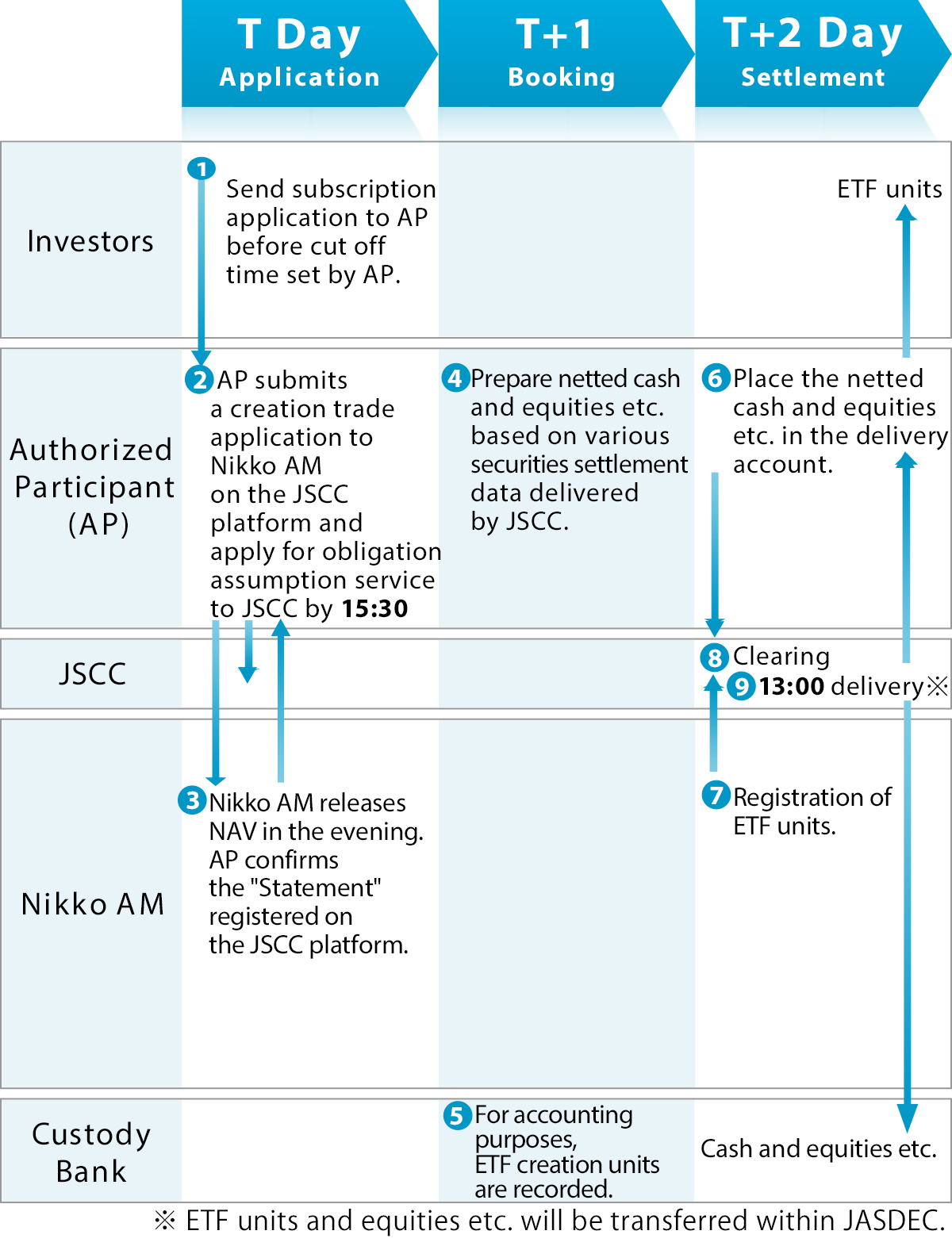
Creation Flow for In-kind Creation/Redemption Type ETFs(Not using obligation assumption service by JSCC)
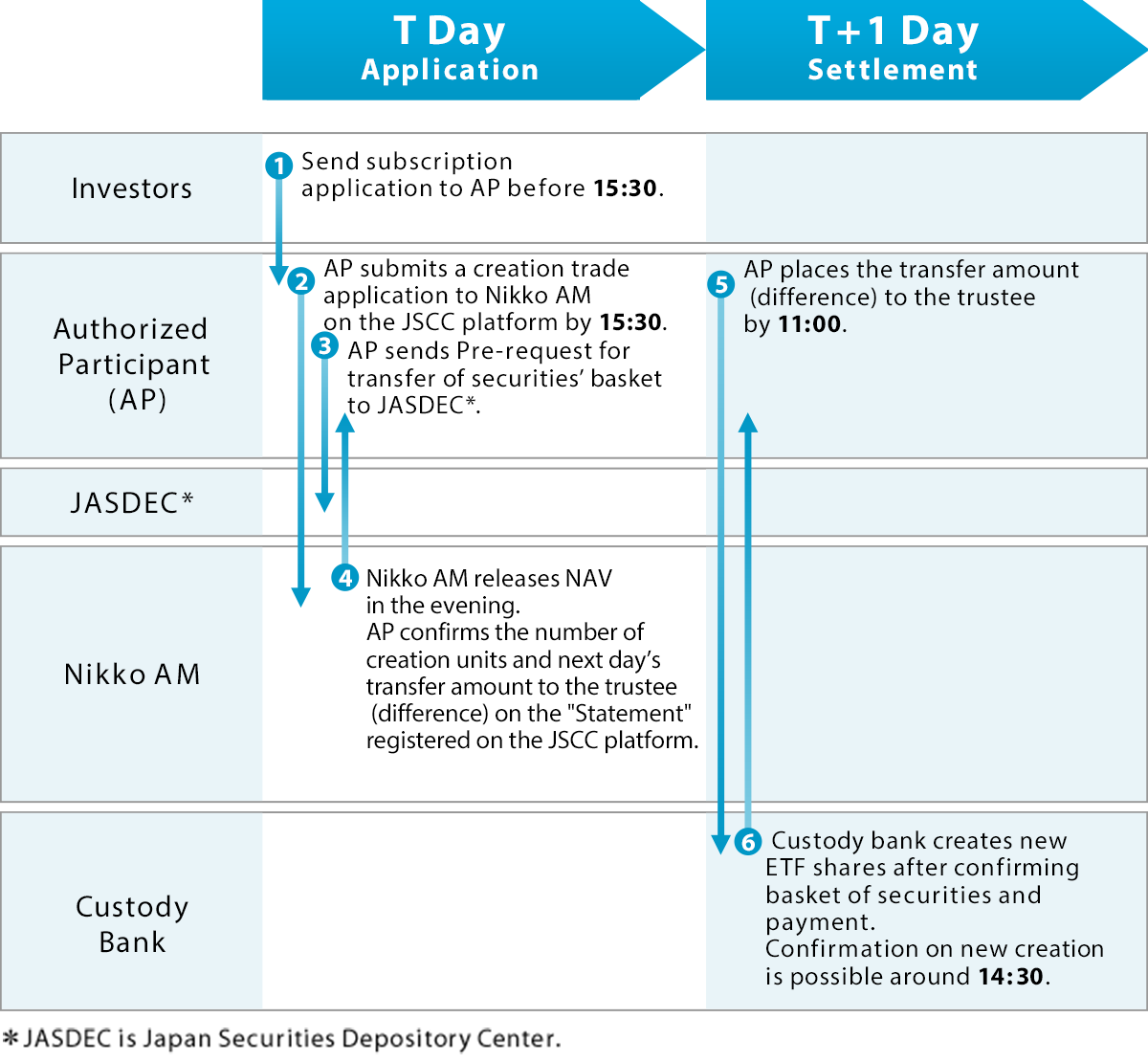
Essential Considerations
- Please secure the basket for creation ETF when making application.
- We recommend you to take measures like borrowing stocks in order to secure the basket for settlement for ETF creation.
Redemption flow for in-kind Creation/Redemption Type ETF(Using obligation assumption service by JSCC)
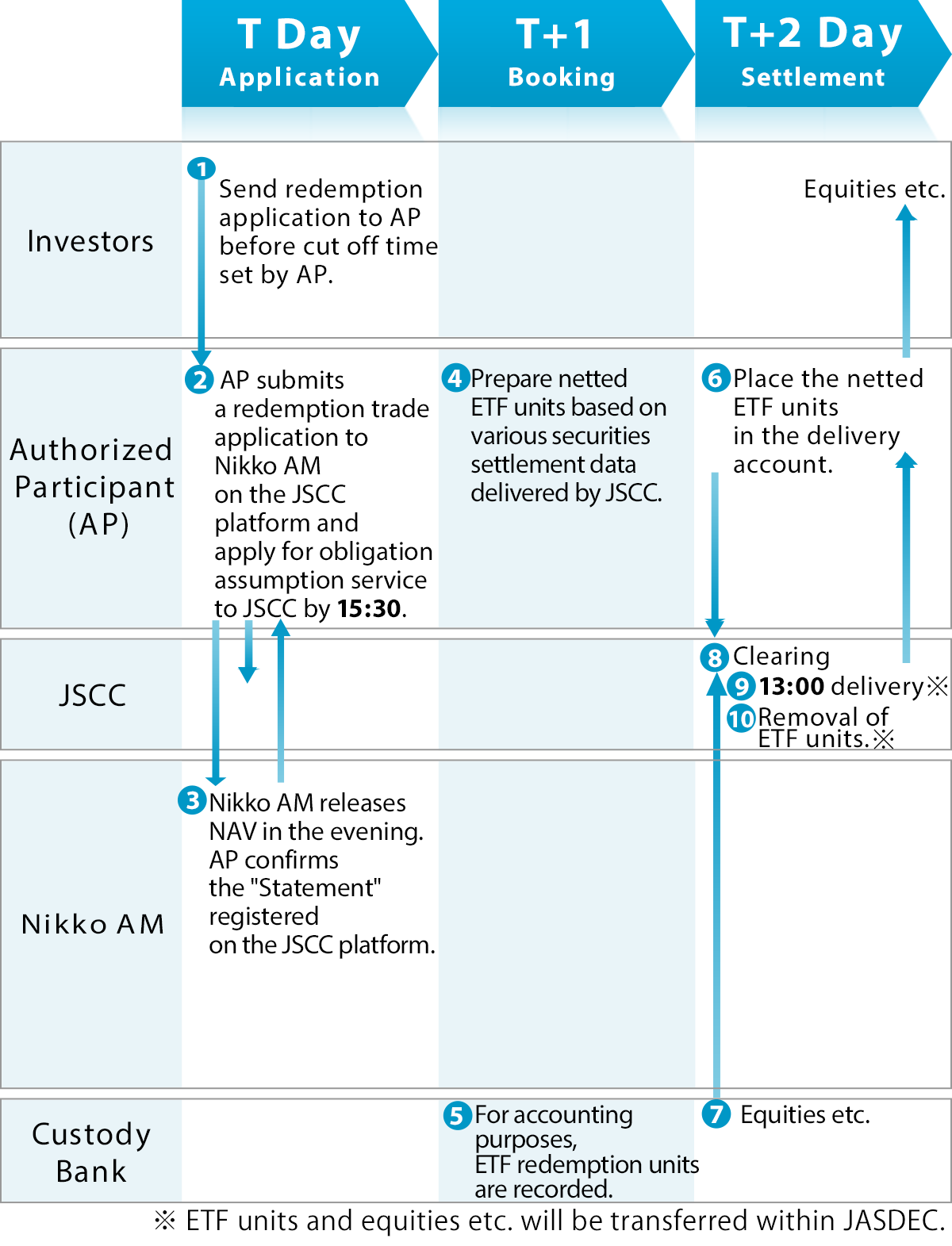
Redemption flow for in-kind Creation/Redemption Type ETF(Not using obligation assumption service by JSCC)
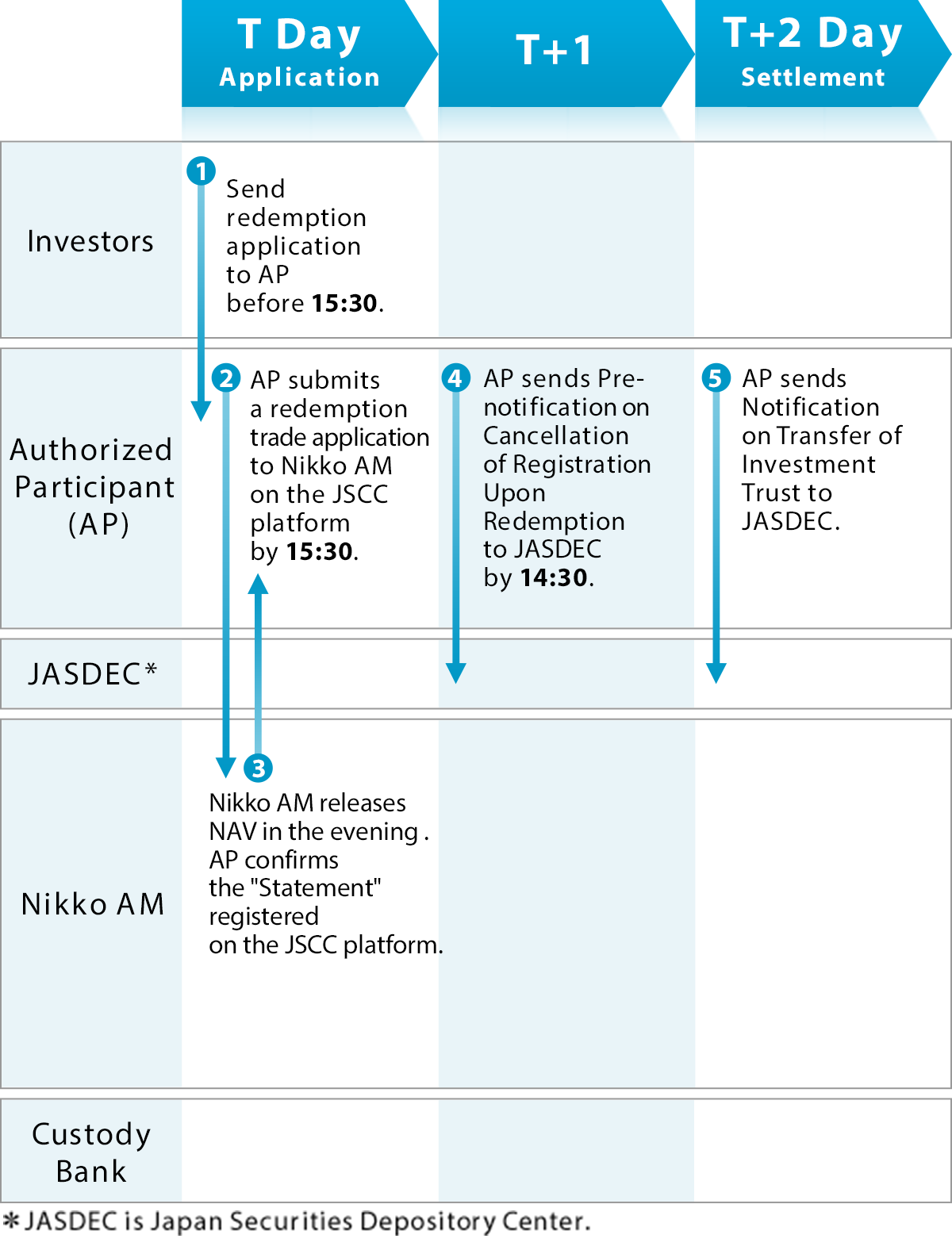
Investors are not guaranteed the investment principal that they commit. Investors may incur a loss and the value of their investment principal may fall below par as the result of a decline in market price or NAV. All profits and losses arising from investments in the Fund belong to the investors (beneficiaries). This fund is different from saving deposit.
The Fund invests primarily in REITs. The NAV of the Fund may fall and investors may suffer a loss due to a decline in stock prices or deterioration in the financial conditions and business performance of an equity issuer.
Major risks are as follows:
1. Price Fluctuation Risk
Income and profits from the sale of real estate and real estate securitized products form the source of earnings for REITs, and REIT prices can fluctuate due to various factors including the circumstances surrounding the real estate, real estate market conditions, trends in long- and short-term interest rates and changes in the macroeconomic environment. Aging and changes in property conditions as well as the loss of or damage to properties from fire or natural disasters can also affect the price. Deterioration in dividends, financial conditions, earnings, and the market environment can cause a decline in the price of the REIT and a loss in the fund.
2. Liquidity Risk
In a situation where the market or trading volume is small, the price at which a security can be purchased or sold can be greatly influenced by the size of the transaction, giving rise to the risk that a transaction cannot be completed at the price expected from the market conditions, that a security cannot be sold as appraised, or that the transaction volume is limited regardless of the price level. This could lead to an unexpected loss.
3. Credit Risk
If Real Estate Investment Trusts become or are anticipated to become insolvent or to enter a state of holding excessive debt, there is a risk that the Fun will incur material losses.
4. Risk Contingent to the Lending of Real Estate Investment Trust Securities
The engaging in security lending incurs counterparty risk (the risk that the lending agreement is not honored or the agreement is canceled due to reasons including a counterparty's bankruptcy) and could cause an unexpected loss as a result. Even when liquidating the position by offsetting it with the collateral upon the default of the lending agreement or cancelation of the agreement, there is the possibility that the acquisition cost of the security from the market may exceed the value of the collateral due to market price fluctuations. In such a case, the fund would need to make up for the price difference, and therefore incur a loss.
Risk of Discrepancies between TSE REIT Index and NAV
This Fund seeks to match with NAV volatility with that of the TSE REIT Index; however, we cannot guarantee that movements will be identical to those of the Index for the following reasons:
- The potential market impact from the trading, etc., of individual issues when portfolio adjustments are made due to changes in the selected issues on the TSE REIT Index or capital transfers, or the costs borne by the Fund such as trust fees, brokerage commission, and audit costs, etc.
- Dividends may be paid by stocks in the portfolio and fees may be earned for securities lent.
- When derivative transactions such as futures are made, there may be disparity between the price movements of all or some of such transactions and that of the TSE REIT Index.
Discrepancy between the market prices at which stocks are traded on financial instruments exchange and the NAV
This Fund is listed on and will be publicly traded on the Tokyo Stock Exchange; however, the market price of units will depend mainly on the Fund's demand, its investment performance, and how attractive it is to investors in comparison to alternative investments, etc. We cannot predict whether the units of this Fund will be traded at the market value, below the NAV or above the NAV
*The prices of REIT securities targeted for investment of this Fund will fluctuate due to the effects of the aforementioned risks. Therefore, please note that this Fund itself has these risks as well.
*The factors that contribute to fluctuations in the NAV are not limited to those listed above.
Additional Considerations
- This document is prepared by Nikko Asset Management Co., Ltd. as sales material for the purpose of providing information on Listed Index Fund J-REIT (Tokyo Stock Exchange REIT Index) Bi-Monthly Dividend Payment Type and promoting investor understanding of this Fund.
- The provisions stipulated in Article 37-6 of the Financial Instruments and Exchange Act ("cooling-off period") are not applicable to Fund transactions.
- This Fund differs from deposits or insurance policies in that it is not protected by the Deposit Insurance Corporation of Japan or the Policyholders Protection Corporation of Japan. Furthermore, units purchased from registered financial institutions, such as banks, are exempted from compensation by the Japan Investor Protection Fund.
- When the Fund faces big redemption causing short term cash requirement or sudden change in the main trading market condition, there can be temporal decline in the liquidity of holding assets, resulting in the risks that Fund unable to trade securities at the expected market prices or appraised prices, or encounters limitation in trading volume. This may result in the negative influence on NAV, suspension of redemption applications, or delay in making payment of redemption.
- When applying to invest in the Fund, please make the decision to invest carefully after taking the time to read the delivered pre-agreement document and other relevant materials in detail.


